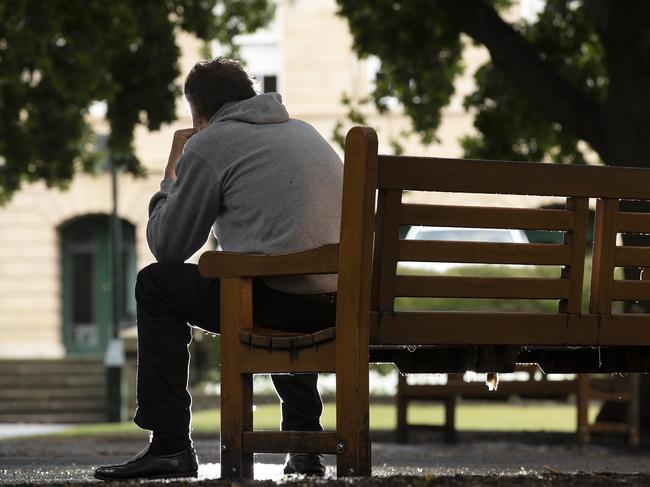Legal delay ‘limbo’ a special hell for Tasmanian sex abuse victims
It took Jonathan* more than 40 years to come forward about the horrific sexual abuse he suffered at the hands of Tasmanian government employees during the 1970s. But despite his bravery, delays by government lawyers are threatening to shred his resilience as he’s denied the closure he’s spent so long waiting for.

Tasmania
Don't miss out on the headlines from Tasmania. Followed categories will be added to My News.
Jonathan* was just 16 years old when he became homeless, living in a cave on Hobart’s bushy perimeter and surviving on a diet of seagulls, plovers and rabbits.
It was the 1970s and the ward-of-the-state had been sexually abused by two government employees – an orphanage house master who had drugged his Milo, and a taxi driver who put the teen through a terrifying ordeal he thought he wouldn’t survive.
Jonathan – who said he felt “dirty” – kept his painful secrets to himself for more than 40 years. He was convinced no one would believe him – because that’s what his abusers had told him.
Finally in 2018, following the royal commission into institutional child sex abuse, Jonathan came forward to police before lodging a compensation claim with the Tasmanian government last August.
But the 59-year-old said legal delays were now “ripping me to pieces” and still didn’t have closure after all these years because government lawyers refused to lock in settlement dates.
Jonathan’s lawyer, Sebastian Buscemi, said his clients were waiting months on end for dates to finalise their claims despite his repeated requests – the delays putting survivors through hell while they waited with no end in sight.
He said it was important to get dates locked in for informal settlements as the outcomes were so much better for sex abuse survivors. He explained settlements usually achieved much higher payout sums than the National Redress Scheme, while also avoiding court hearings, which survivors often found traumatic.
Institutional child sex payouts are new territory in Tasmania after the state’s statute of limitations on child sex cases was finally lifted in 2018, with about 250 survivors waiting on Mr Buscemi’s books.
To date, only one survivor’s payout has been finalised, which finally occurred in December last year after a 12-month wait. But even then, as Mr Buscemi explained, that only occurred after he lodged a complaint with the Attorney-General’s office over delays in setting dates.
Mr Buscemi said victims were waiting months on end before even receiving the government records they needed to proceed with legal action.
He said delays of 12 months were unreasonable, as were the uncertainty and fresh trauma suffered by survivors waiting months on end to finalise their cases.
“Tasmanians had to wait so long for the opportunity to pursue these claims,” Mr Buscemi said.
“It’s not just the eight or nine months of uncertainty now, it’s the years of uncertainty trying to get them to abolish limitation periods.”
Jonathan said all he wanted was a settlement date so he could close that painful chapter of his life.
“At the moment, we’re sitting in limbo. The uncertainty of it all is just ridiculous,” he said.
“It’s not so much the money, it’s [about getting it] over and done with.
“You never, ever get justice. You’re going to your grave with it all, but it just takes that little bit off it, knowing that file’s been shut.”
Unlike mainland Australia, which has processed thousands of clergy abuse cases in recent years following the royal commission, most of Tasmania’s history of child sex abuse occurred at the hands of state government employees such as teachers and orphanage workers – and continued right up until the late 1990s.
Jonathan thought he would never tell a soul what had happened to him until a few years ago when “the system started to believe”.
“I actually had an interview with a detective sergeant from the Kingston police station and he was the one that changed my mind because he said to me, [Jonathan], we will believe you’,” he said.
“That to me was one of the most powerful things anyone has ever said to me in my life.”
A spokesperson said the State Government did prioritise child sex abuse information requests.
They said changes had been made to help survivors access compensation, including the power to set aside legal documents that may have protected the government from legal responsibility – if it was deemed in the interests of justice to do so.
“[The Government] is currently exploring options for streamlining civil settlement processes including ensuring that the processes are trauma-informed,” the spokesperson said.
*Jonathan is a pseudonym. The Tasmanian media is legally precluded from publishing the names of sex abuse victims, even if they want to tell their story, under section 194K of the Evidence Act. The Government has promised to scrap the law following last year’s #LetHerSpeak campaign spearheaded by sexual assault survivor Grace Tame and backed by the Mercury.


